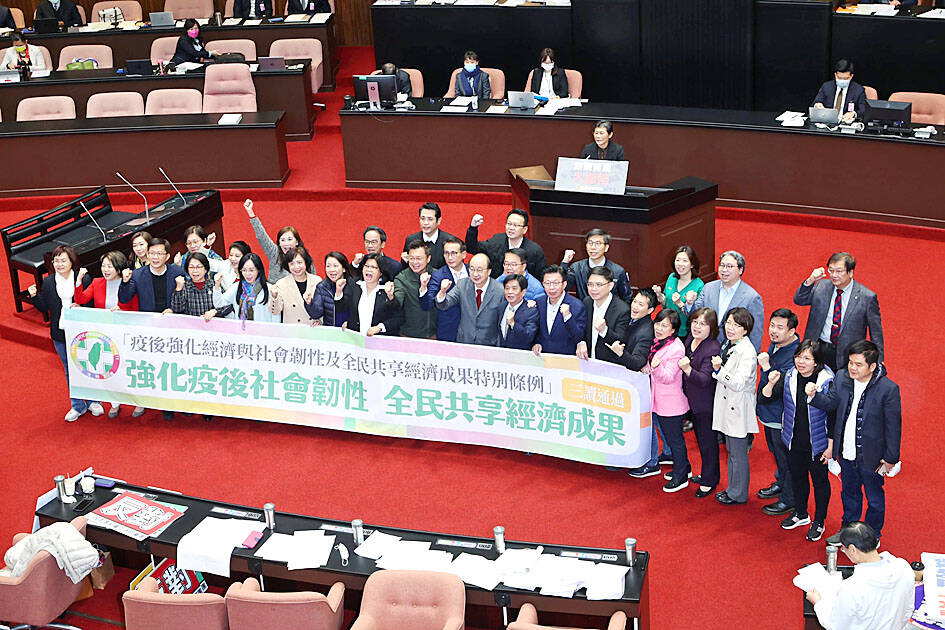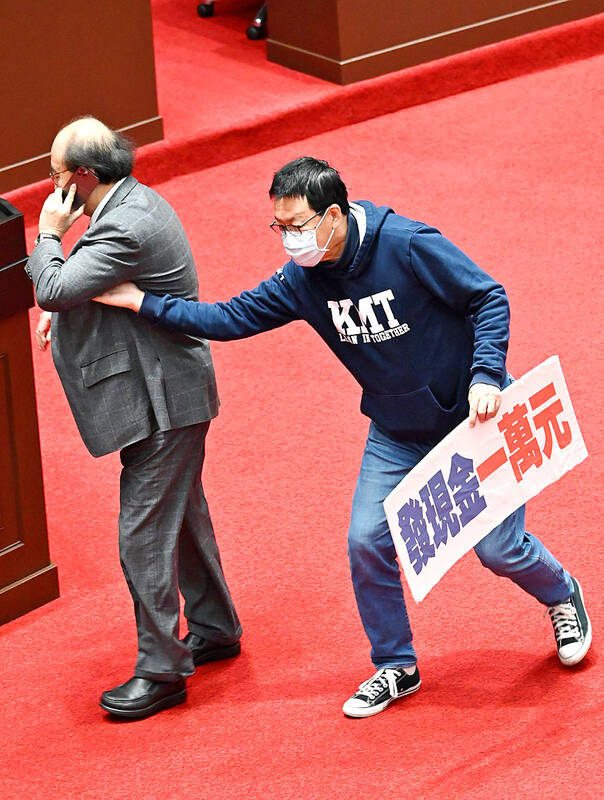The legislature yesterday passed a special bill to allocate NT$380 billion (US$12.49 billion) from last year’s surplus tax revenue to help Taiwan recover from the COVID-19 pandemic, which includes a provision to issue NT$6,000 cash handouts to all Taiwanese and tax-paying permanent residents.
In addition to the handouts, the surplus would be used to replenish the National Health Insurance fund and the Labor Insurance Fund, and subsidize the operations of state-run Taiwan Power Co (台電), according to the “special act for strengthening economic and social resilience after the pandemic and sharing economic results with the public.”
The funds could also be used to subsidize housing policies, public transportation costs, social welfare policies covering disadvantaged groups, and policies to help upgrade small and medium-sized enterprises, the bill says.

Photo: CNA
They could also be used to to attract international tourists, improve agricultural infrastructure and the rights and interests of fishers, and subsidize student loans, and cultural sectors and activities, it says.
The bill includes a sunset clause that sets the end date for the act and a matching special budget as Dec. 31, 2025.
The Cabinet must now submit a special budget request to the legislature for review before the surplus can be appropriated.

Photo: Liu Hsin-te, Taipei Times
A motion tendered by the Chinese Nationalist Party (KMT) caucus to issue NT$10,000 cash handouts instead of NT$6,000 was rejected by Democratic Progressive Party (DPP) lawmakers during the all-member hearing.
A motion sponsored by the DPP stating that all Taiwanese born before the act’s expiration date would receive the cash handout was passed as an addendum.
KMT caucus convener William Tseng (曾銘宗) expressed regret at the KMT’s motion being rejected.
The government has enough resources to fund NT$10,000 handouts, as last year’s tax surplus totaled NT$490 billion, and the surplus from 2021 can be added to the share allocated for cash handouts, Tseng said.
The Cabinet should propose plans to use the surplus to boost support for disadvantaged people, especially as real wages have been falling, he said.
President Tsai Ing-wen (蔡英文) during her New Year’s address on Jan. 1 said that a portion of last year’s tax surplus would be reserved in case of an emergency.
New Power Party Chairwoman and deputy caucus convenor Chen Jiau-hua (陳椒華) expressed concern that the planning of special budgets could become normalized, which she said would result in breaches of fiscal discipline.
The Ministry of Finance should be more precise in estimating its tax revenue to avoid overtaxing people rather than engaging in pork-barrel spending, she said.
Taiwan People’s Party caucus convener Chiu Chen-yuan (邱臣遠) said that the DPP should not have used a special budget to fund what should have been general budgetary items.
This has given rise to half-baked policies resulting from a desire to engage in pork-barrel spending ahead of next year’s presidential and legislative elections, Chiu said.
Minister Without Portfolio Lo Ping-cheng (羅秉成) said that the Cabinet would deliberate the special budget proposal tomorrow and deliver it to the legislature.
DPP caucus director-general Cheng Yun-peng (鄭運鵬) said that people would start receiving the handouts in April at the earliest.
The four legislative caucuses have agreed to ask Premier Chen Chien-jen (陳建仁) to report to the legislature on Friday next week, after which the budget request would enter committee review, Cheng said.
The request would likely be deliberated by the caucuses for about a month, given a lack of consensus on how to spend the surplus, before it is reviewed during an all-member hearing on April 10, he said.

Right-wing political scientist Laura Fernandez on Sunday won Costa Rica’s presidential election by a landslide, after promising to crack down on rising violence linked to the cocaine trade. Fernandez’s nearest rival, economist Alvaro Ramos, conceded defeat as results showed the ruling party far exceeding the threshold of 40 percent needed to avoid a runoff. With 94 percent of polling stations counted, the political heir of outgoing Costa Rican President Rodrigo Chaves had captured 48.3 percent of the vote compared with Ramos’ 33.4 percent, the Supreme Electoral Tribunal said. As soon as the first results were announced, members of Fernandez’s Sovereign People’s Party

MORE RESPONSIBILITY: Draftees would be expected to fight alongside professional soldiers, likely requiring the transformation of some training brigades into combat units The armed forces are to start incorporating new conscripts into combined arms brigades this year to enhance combat readiness, the Executive Yuan’s latest policy report said. The new policy would affect Taiwanese men entering the military for their compulsory service, which was extended to one year under reforms by then-president Tsai Ing-wen (蔡英文) in 2022. The conscripts would be trained to operate machine guns, uncrewed aerial vehicles, anti-tank guided missile launchers and Stinger air defense systems, the report said, adding that the basic training would be lengthened to eight weeks. After basic training, conscripts would be sorted into infantry battalions that would take

GROWING AMBITIONS: The scale and tempo of the operations show that the Strait has become the core theater for China to expand its security interests, the report said Chinese military aircraft incursions around Taiwan have surged nearly 15-fold over the past five years, according to a report released yesterday by the Democratic Progressive Party’s (DPP) Department of China Affairs. Sorties in the Taiwan Strait were previously irregular, totaling 380 in 2020, but have since evolved into routine operations, the report showed. “This demonstrates that the Taiwan Strait has become both the starting point and testing ground for Beijing’s expansionist ambitions,” it said. Driven by military expansionism, China is systematically pursuing actions aimed at altering the regional “status quo,” the department said, adding that Taiwan represents the most critical link in China’s

EMERGING FIELDS: The Chinese president said that the two countries would explore cooperation in green technology, the digital economy and artificial intelligence Chinese President Xi Jinping (習近平) yesterday called for an “equal and orderly multipolar world” in the face of “unilateral bullying,” in an apparent jab at the US. Xi was speaking during talks in Beijing with Uruguayan President Yamandu Orsi, the first South American leader to visit China since US special forces captured then-Venezuelan president Nicolas Maduro last month — an operation that Beijing condemned as a violation of sovereignty. Orsi follows a slew of leaders to have visited China seeking to boost ties with the world’s second-largest economy to hedge against US President Donald Trump’s increasingly unpredictable administration. “The international situation is fraught